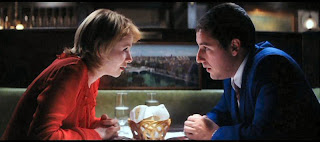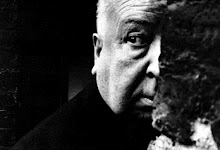 Paper Abstract:
Paper Abstract:Before there was blood, there was Punch-Drunk Love. Written and directed by Paul Thomas Anderson and released in 2002, Punch-Drunk Love pays homage to its cinematic heritage by reinventing preexisting genre archetypes. It is also a wonderful example of a “comedy of romance,” as opposed to the more traditional “romantic comedy.” In a comedy of romance, the complexities of characters and relationships are explored, whereas in a romantic comedy, the goal is for boy to inevitably get girl after encountering numerous obstacles that keep them apart. Punch-Drunk Love stars Adam Sandler as Barry Egan, a lonely, insecure, depressed, angry man, and the film follows Barry’s unconventional relationship with Lena. Anderson’s unique ode to love also recalls two other films from the romantic comedy genre, Preston Sturges’ Hail the Conquering Hero (1944) and Cameron Crowe’s Say Anything… (1989). By citing specific examples, this paper examines those three aspects of Punch-Drunk Love: its use of archetypes, its categorization as a comedy of romance, and its comparison to other films from the genre.

Paper Excerpts:
While romantic comedies today do not necessarily have easily identifiable archetypes, such as the spoiled heiress or working-class spitfire born of the Depression, they still very much exist. In Punch-Drunk Love, Barry Egan most obviously resembles the self-exploratory male. Barry is completely closed-off and rather socially awkward. He displays anxiety after his first meeting with Lena when she drops her car off to be repaired and gives her keys to him. After she leaves, he quickly retreats behind the nearest wall, completely out of breath and seeking solace in the dark. His entire existence can pretty much be summed up by his obsessive need to collect the frequent flyer miles offered by Healthy Choice. However, he has no plan to use them to go anywhere. He is totally complacent and does not possess any real initiative or motivation. His sisters constantly ridicule him, which helps explain his utter lack of self-esteem. He is also violently angry, and his rage erupts without any warning. Barry is the ultimate self-exploratory male without even realizing that he is in need of self-exploration.
Without a doubt, the relationship between Barry and Lena is the most significant. It is the perfect example of the attraction of complements. Barry desperately needs someone like Lena to treat him with some kindness, since he has never been treated kindly before. Lena needs a relationship to build a solid foundation on because she is constantly traveling for her work. They connect, deeply and immediately, and after he leaves her apartment after their first date, he chastises himself for his exit line: “And bye-bye, you stupid motherfucker.” Once downstairs, he gets a phone call from Lena, who sweetly and bravely tells him, “I just wanted you to know, wherever you’re going or whatever you’re doing right now, I want you to know that I wanted to kiss you just then.” He runs all the way back to her apartment, but Anderson subverts typical romantic expectations by having Barry get lost several times along the way. By the time he arrives at her door, he is completely out of breath. He kisses her and then proceeds to leave again. The fact that Lena does not find this odd in the least, and the fact that the viewer does not question it either, proves their compatibility. Anderson chooses to explore several different types of relationships in order to help the audience understand Barry, but also to challenge the viewer to seek personal connections and refuse to accept the interpersonal complacency that paralyzes Barry for most of the film.
More than anything, Punch-Drunk Love is about Barry’s perilous journey of self-discovery. At one point, he tells his brother-in-law, in a voice simultaneously sheepish, defeated, and apologetic, “I don’t like myself sometimes.” He continues, “I sometimes cry a lot, for no reason.” He then proceeds to burst into tears on the spot, making the viewer both chuckle and cringe. Like Todd Solondz, Anderson knows how to successfully walk the line between endearingly funny and pathetic or offensive. Barry inhabits a blue universe – he wears a blue suit, and his apartment is bathed in an eerie blue glow. He is constantly framed alone in the midst of a vast open space, like at the beginning of the film when his desk is shoved into the corner of the room at work. At his apartment, Anderson chooses to show Barry either on the very edge of the frame, like when he sits alone at the kitchen table opposite a gapingly empty chair, or to follow him around claustrophobically as he paces his home, anxious and uncomfortable in his own skin. He pleads with Lena to be patient with him and assures her, “I don’t freak out.” Yet Barry’s resolution proves that the film is a comedy of romance. He confronts Dean, fueled by his love for Lena, and says in the most confident voice he has used the entire film, “I have so much strength in me. You have no idea. I have a love in my life. It makes me stronger than you can imagine.” Barry is a different and better person at the end of the film, and that is what sets Punch-Drunk Love apart.
Yet even though this film is unquestionably a comedy of romance, when the film is romantic, it is overwhelmingly romantic. In fact, the romance is played very melodramatically. On a pay phone that is directly on a parade route in Hawaii, he calls Lena, and when she answers, the phone booth lights up magically, gold and radiant. They meet up in this utopian paradise of white and pink columns, surrounded by impossibly lush vegetation. Their bodies meet in silhouette, and they stand still and kiss as people walk back and forth in front of them. Finally, they rest their heads against each other, and the space in between them forms a heart. When they have sex for the first time, they engage in cannibalistic banter. She tells him, “I want to chew your face, and I want to scoop out your eyes, and I want to eat them.” But the way Sandler and Watson deliver the words Anderson wrote makes this horrific dialogue seem poetic and sweet. It is one of the most romantic scenes in one of the most unexpectedly romantic films in recent years. Anderson demonstrates that making a comedy of romance does not require the sacrifice of unabashed romanticism.
Preston Sturges’ contribution to the romantic comedy genre as a writer-director is incalculable. “Sturges’ brand of intelligence was not only sharp but wild and cynical as well” (Kendall 263). Hail the Conquering Hero, released in 1944, “was the last of Sturges’ Paramount films, and it’s among his densest, richest, most oddly beautiful works” (Harvey 633). It features Woodrow Lafayette Pershing Truesmith (Eddie Bracken), the son of a military hero who was discharged from the Marines for chronic hayfever and is too humiliated to return home.
At the beginning of the film, the camera tracks down a bar past all of the patrons, travels over a large, empty space, and finally lands on Woodrow sitting despondently at the end of the bar, a virtual chasm between him and the rest of humanity. Anderson utilizes this framing technique over and over again to emphasize Barry’s loneliness. When Woodrow encounters some actual Marines, they convince him to go home and then fabricate his heroism, leading to lots of adulation that he acquires fraudulently, causing him tremendous torment and exacerbating his preexisting identity confusion. Like Barry, he must ultimately confront his demons and find himself, which he does at the end of the film in a heartbreaking monologue formidably delivered by Bracken: “If I could have reached as high as my father’s shoestrings, my whole life would be justified and I would stand here proudly before you…instead of as the thief and coward that I am.” The town always accepted Woodrow, but at the end, he learns to accept himself. Also, on a purely comedic level, Punch-Drunk Love, full of broad physical humor, echoes Sturges’ propensity for pratfalls.
Whereas Hail the Conquering Hero ends fairly optimistically, if ironically, Say Anything… examines love from the perspective of pain. At the beginning of the film, when Lloyd Dobler (John Cusack) describes his desire to pursue Diane Court (Ione Skye) and gets warned against it, he professes, “I want to get hurt!” This rather grim declaration expresses the very simple fact that being in love requires insanity and a little masochism. Written and directed by Cameron Crowe, Say Anything…, released in 1989, bears striking similarities to Punch-Drunk Love. Lloyd basically is Barry, although not as self-destructive. Lloyd expresses his anger and frustration through kickboxing instead of busting patio doors or beating up bathrooms. He is insecure and feels inferior to brainy Diane, much like Barry undoubtedly feels with Lena. This is a true attraction of complements, because Lloyd teaches Diane to relax and have fun, and Diane makes him feel more confident. At one point, he states, “The girl made me trust myself.”
Like Barry and Woodrow, Lloyd’s future is uncertain, but he is honest with himself about it. When his teacher challenges him about making a decision, he counters, “But I know that I don’t know.” He must figure out what he wants to do with his life, and he decides that Diane is the answer. If they are together, he believes everything else will fall into place. Even though the ending leaves it up to the viewer, it appears that Lloyd is right. One other important issue that Cameron Crowe and Paul Thomas Anderson agree upon is the necessity of a grand romantic gesture. Say Anything… features certainly one of the most touching, powerful, and heartfelt gestures in the history of cinema. John Cusack standing outside of the window holding the boombox over his head while Peter Gabriel’s “In Your Eyes” fills the restless summer night air is simply unforgettable. Similarly, the montage of Barry traveling to Hawaii to find Lena, including the dramatic walk down the glowing white hallway to the plane and culminating in their silhouettes kissing amidst a colorful paradise, all while “He Needs Me” underscores the giddy romanticism, is just as grand and effective a gesture as the boombox. By examining other films with similar themes, it puts Punch-Drunk Love in perspective in the overall genre, but it also highlights and celebrates its uniqueness.

No comments:
Post a Comment